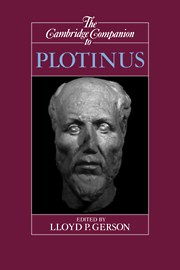Book contents
- Frontmatter
- Introduction
- 1 Plotinus
- 2 Plotinus's metaphysics of the One
- 3 The hierarchical ordering of reality in Plotinus
- 4 On soul and intellect
- 5 Essence and existence in the Enneads
- 6 Plotinus on the nature of physical reality
- 7 Plotinus on matter and evil
- 8 Eternity and time
- 9 Cognition and its object
- 10 Self-knowledge and subjectivity in the Enneads
- 11 Plotinus
- 12 Human freedom in the thought of Plotinus
- 13 An ethic for the late antique sage
- 14 Plotinus and language
- 15 Plotinus and later Platonic philosophers on the causality of the First Principle
- 16 Plotinus and Christian philosophy
- Bibliography
- Index
6 - Plotinus on the nature of physical reality
Published online by Cambridge University Press: 28 May 2006
- Frontmatter
- Introduction
- 1 Plotinus
- 2 Plotinus's metaphysics of the One
- 3 The hierarchical ordering of reality in Plotinus
- 4 On soul and intellect
- 5 Essence and existence in the Enneads
- 6 Plotinus on the nature of physical reality
- 7 Plotinus on matter and evil
- 8 Eternity and time
- 9 Cognition and its object
- 10 Self-knowledge and subjectivity in the Enneads
- 11 Plotinus
- 12 Human freedom in the thought of Plotinus
- 13 An ethic for the late antique sage
- 14 Plotinus and language
- 15 Plotinus and later Platonic philosophers on the causality of the First Principle
- 16 Plotinus and Christian philosophy
- Bibliography
- Index
Summary
Plotinus adheres to the classical Greek tenet that we understand and explain something's nature by knowing and articulating its causes, and he articulates the order of causes which explains physical reality as a metaphysical procession whose first principle is his One. Here, though, I shall focus on some main features of Plotinus's analysis of physical reality which prepare the way for relating it to his metaphysical principles.
Plotinus thinks of physical reality, first and foremost, as the domain of coming-to-be (genesis). His analysis of coming-to-be focuses on the coming-to-be of particular things - for example, particular plants or animals or human beings and, in so doing, he intends to continue Plato's project of assuring and explaining the real existence of those particulars and of their comings-to-be. Plotinus does so, in part, by incorporating into his analysis the notion of substance (ousia), which Aristotle introduced to denote the proper subject)s) for assertions of real existence or ascriptions which presuppose real existence; but he considers the notion of substance to be by itself insufficient for his explanatory task.
- Type
- Chapter
- Information
- The Cambridge Companion to Plotinus , pp. 130 - 170Publisher: Cambridge University PressPrint publication year: 1996
- 7
- Cited by

